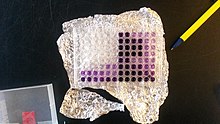Bicinchoninic acid assay
The bicinchoninic acid assay (BCA assay), also known as the Smith assay, after its inventor, Paul K. Smith at the Pierce Chemical Company,[1] now part of Thermo Fisher Scientific, is a biochemical assay for determining the total concentration of protein in a solution (0.5 μg/mL to 1.5 mg/mL), similar to Lowry protein assay, Bradford protein assay or biuret reagent. The total protein concentration is exhibited by a color change of the sample solution from green to purple in proportion to protein concentration, which can then be measured using colorimetric techniques.

Mechanism
A stock BCA solution contains the following ingredients in a highly alkaline solution with a pH 11.25: bicinchoninic acid, sodium carbonate, sodium bicarbonate, sodium tartrate, and copper(II) sulfate pentahydrate.
The BCA assay primarily relies on two reactions. First, the peptide bonds in protein reduce Cu2+ ions from the copper(II) sulfate to Cu+ (a temperature dependent reaction). The amount of Cu2+ reduced is proportional to the amount of protein present in the solution. Next, two molecules of bicinchoninic acid chelate with each Cu+ ion, forming a purple-colored complex that strongly absorbs light at a wavelength of 562 nm.
The bicinchoninic acid Cu+ complex is influenced in protein samples by the presence of cysteine/cystine, tyrosine, and tryptophan side chains. At higher temperatures (37 to 60 °C), peptide bonds assist in the formation of the reaction complex. Incubating the BCA assay at higher temperatures is recommended as a way to increase assay sensitivity while minimizing the variances caused by unequal amino acid composition.[2]
The amount of protein present in a solution can be quantified by measuring the absorption spectra and comparing with protein solutions of known concentration.
See also
References
- Smith, P.K.; et al. (1985). "Measurement of protein using bicinchoninic acid". Anal. Biochem. 150 (1): 76–85. doi:10.1016/0003-2697(85)90442-7. PMID 3843705.
- Olsen BJ, Markwell J (2007). "Assays for the Determination of Protein Concentration" (PDF). Current Protocols in Protein Science: 14–17.
- Wiechelman, K.; Braun, R. & Fitzpatrick, J. (1988). "Investigation of the bicinchoninic acid protein assay: Identification of the groups responsible for color formation". Anal. Biochem. 175 (1): 231–7. doi:10.1016/0003-2697(88)90383-1. PMID 3245570.
- Stoscheck, CM. (1990). "Quantitation of Protein". Methods in Enzymology. 182: 50–69. doi:10.1016/0076-6879(90)82008-P. ISBN 9780121820831. PMID 2314256.